Contents
Strawberries or garden strawberries can be attributed, without dissembling, to the most beloved berries. Today, many gardeners grow delicious fragrant fruits, but it quickly leaves in garden plots. And how you want fresh berries to be on the table all year round.
Growing strawberries using Dutch technology allows you to get products all year round. For planting, indoor soil with a specially created microclimate, irrigation system and lighting is used. Today, many gardeners thanks to this method make a good profit. The question of whether it is possible to grow Dutch-style strawberries in small areas worries not only beginner gardeners, but also experienced gardeners.
Why Choose Dutch Technology
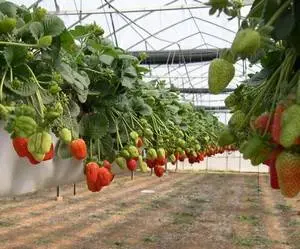
The technology comes from Holland, as the name suggests. This country is the leader in the export of strawberries. The method can be applied at home, providing fragrant berries not only to your family. Part of the harvested crop can be put on sale to recoup the costs.
The application of the technique does not require large areas and special means. The main thing is to have a greenhouse in which you can grow plants even in winter. You can practice growing strawberries using Dutch technology at home on the windowsill. At this stage, you can find out what kind of thermal and light conditions, microclimate plants need. A large farm will require special equipment. Today, there are a lot of videos on the Internet that talk about different ways to grow strawberries.
The essence of technology
The Dutch way of growing strawberries has a number of features:
- First, it is necessary to equip a room for planting plants. The main thing is that it was closed ground. Capacities can be very different. Strawberries can be grown in boxes, bags, pallets, and even flower pots.
- Secondly, according to the technology, plants cannot bear fruit all year round, so some of the bushes have to be sent into hibernation, while others receive top dressing and continue to work for the harvest. The technology of growing strawberries all year round involves planting seedlings with an interval of two months.
- Thirdly, nutrients and moisture are supplied to each root through drip irrigation.
- “Beds” can be arranged vertically and horizontally.
Advantages
The Dutch technology of growing strawberries is being practiced by more and more gardeners today. She has many advantages:
- Placement of a large number of plants with minimal use of acreage.
- In greenhouses with heating and transparent walls, strawberries have enough natural light.
- Any premises can be used for planting.
- The resulting products do not get sick and do not suffer from pests, because they do not come into contact with the ground.
- A stable harvest in one and a half to two months makes the Dutch technology of growing strawberries attractive for businessmen.
- The taste of the berries is in no way inferior to the fruits grown in the traditional way.
- A system installed once can last for many years.
Which boarding method to choose
Strawberries according to Dutch technology can grow in different placements – vertical or horizontal. Gardeners are constantly arguing about this. Although any of the methods is good in its own way under certain conditions. But the main advantage of any is the minimum occupied area for growing a large number of seedlings.
In a large and bright greenhouse, you can use both methods of placing beds. If a garage or a loggia is occupied by strawberries, then it is best to place the plantings vertically with additional lighting.
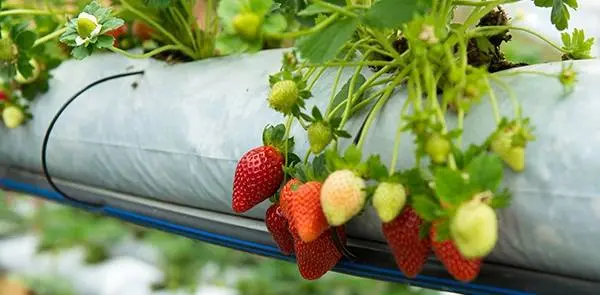
Planting material
What varieties are suitable
Having become acquainted with the description of the technology, gardeners must not only install the equipment, but also select the appropriate strawberry varieties, since not everyone is suitable for the Dutch method. Remontant varieties are considered the best, which give good yields even in open ground. But their most important advantage is self-pollination.
Recommended varieties:
- Maria and Tristar;
- Selva and Elsanta;
- Sonata and Tribute;
- Marmolada and Polka;
- Darselect and Darkness.
Strawberry growing technology

Growing seedlings
Step by step instructions (some steps can be skipped):
- The soil for growing seedlings is prepared in the fall, superphosphate, potassium chloride, lime and manure are added. Do not use soil from the ridges where strawberries grew.
- Continuous harvest throughout the year can be obtained with proper work with seedlings. When breeding strawberries, you need to run some of the plants for artificial rest and wake them up at the right time for the gardener. In their natural environment, plants sleep in the winter under the snow. You can get planting material from seeds or by rooting mustaches and rosettes. First-year plants grown from seeds or mustaches should not be allowed to bloom, flower stalks should be removed ruthlessly.
- The next year, the mother bushes will give up to 15 tendrils, from which healthy rosettes can be grown. As a rule, the dormant period for strawberries falls on the second half of October. At this time, sockets are dug up so that they are not killed by frost.
- Leave them indoors at a temperature of +10-12 degrees for 24 hours. After that, remove the leaves, soil, vegetative shoots. Roots must not be touched.
- Planting material is tied into bundles and put into thin plastic bags. Store seedlings in the refrigerator on the bottom shelf (box for vegetables). It is there that the temperature of 0 degrees is necessary for planting material. High temperatures will promote premature growth of strawberries, and at low temperatures, the plants will die.
- The day before planting, the planting material is taken out of the storage, kept at a temperature of + 12 degrees.
- Mix sterile soil consisting of sandy soil with rotted manure and sand in a ratio of 3:1:1. Instead of sandy soil, some Dutch strawberry growers use mineral wool or coir.
- Fill containers with soil and plant seedlings. Plants need to be watered drip.
- Growing strawberries must comply with agricultural practices.
- After the crop is harvested, the strawberry bushes must be removed, leaving some of the most productive plants for new seedlings.
When grown outdoors, replacement is done after 4 years.
Video about the secrets of Dutch technology:
Lighting
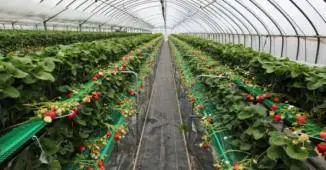
If you decide to use the Dutch method, you will have to think about the lighting system. Remontant strawberry varieties require good lighting. Especially in the autumn-spring period. Lamps are located at a height of at least a meter from the plants. Reflective materials can be installed to improve efficiency.
The lamps in the greenhouse should burn for about 16 hours, only in this case it is possible to guarantee the normal development and fruiting of strawberries grown according to the Dutch technology. Approximately a decade after planting, the plants begin to throw out flower stalks, and after 30-35 days, depending on the precocity of the variety, berries appear.
Irrigation system
The Dutch method of growing strawberries involves drip irrigation. It does not matter whether water will penetrate to the plants from above or through the soil, the main thing is that it does not fall on the leaves.
With the proper organization of the irrigation system, strawberries will not be affected by diseases. Plants should be watered with warm water. At the same time top dressing is applied under the root. The Dutch system for growing strawberries in a greenhouse does not involve foliar top dressing.
Containers for growing strawberries
Gardeners who are interested in the features of the Dutch method are interested in the question of which containers are best to choose.
At home, you can use boxes or bags. The second option is used more often.
How to plant plants in bags
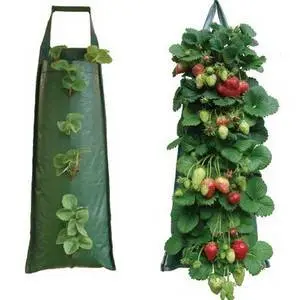
We bring to your attention a video about growing garden strawberries in bags:
The figure above shows a variant of plastic bags in which strawberry bushes are planted. The diameter of the container should be at least 15 cm. Plants are planted in a bag filled with soil at a distance of 20-25 cm, preferably in a checkerboard pattern.
Seedlings are inserted into the slots at an angle of 40 degrees, carefully straightening the root system. Roots should always point down. Plastic containers can be laid on the windowsill or placed on the balcony with a pyramid in several rows. In this case, the yield increases.
Large bags with placed strawberries are grown according to Dutch technology in greenhouses. Look at the photo below how the landings look. In the strawberries grown in the greenhouse according to this method, all the vitamins are present, the taste qualities are preserved.
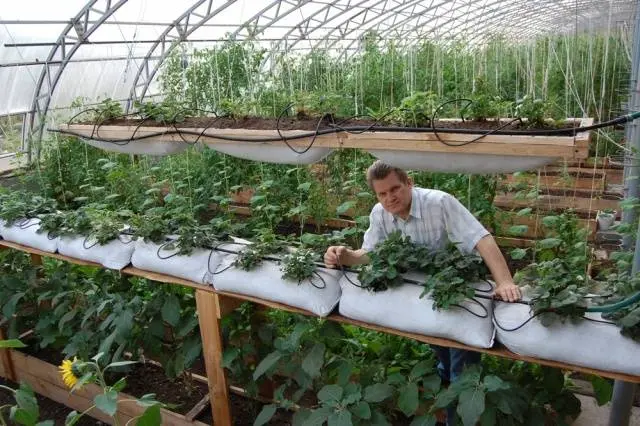
To summarize
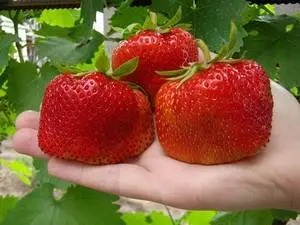
The main thing for a gardener is to get a rich harvest with minimal labor costs. The Dutch technology makes it possible to grow a large number of strawberry bushes horizontally or vertically in a small greenhouse area.
The method does not cause any particular difficulties, you just need to follow agrotechnical standards and treat your business with love.









